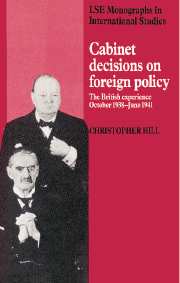Book contents
- Frontmatter
- Contents
- List of figures
- List of tables
- Acknowledgements
- Preface
- 1 Cabinets, foreign policies and case-studies
- 2 Constructing the Polish Guarantee, 15–31 March 1939
- 3 The Soviet question, April–August 1939
- 4 Entry into war, 1–3 September 1939
- 5 Reacting to the ‘peace offensive’, October 1939
- 6 To continue alone? May–July 1940
- 7 The longer term: War Aims and other committees, October 1940–June 1941
- 8 Decision-making in Cabinet
- Appendix 1 The Chamberlain Cabinet, 31 October 1938–3 September 1939
- Appendix 2 Attendance at the Foreign Policy Committee of the Cabinet, 14 November 1938–25 August 1939
- Appendix 3 Neville Chamberlain's statement in the House of Commons, 12 October 1939
- Appendix 4 Lord Halifax's paper for the War Aims Committee, October 1940
- Appendix 5 Anthony Eden's speech at the Mansion House, 29 May 1941 (extract)
- Notes
- Bibliography
- Index
- LSE MONOGRAPHS IN INTERNATIONAL STUDIES
1 - Cabinets, foreign policies and case-studies
Published online by Cambridge University Press: 02 February 2010
- Frontmatter
- Contents
- List of figures
- List of tables
- Acknowledgements
- Preface
- 1 Cabinets, foreign policies and case-studies
- 2 Constructing the Polish Guarantee, 15–31 March 1939
- 3 The Soviet question, April–August 1939
- 4 Entry into war, 1–3 September 1939
- 5 Reacting to the ‘peace offensive’, October 1939
- 6 To continue alone? May–July 1940
- 7 The longer term: War Aims and other committees, October 1940–June 1941
- 8 Decision-making in Cabinet
- Appendix 1 The Chamberlain Cabinet, 31 October 1938–3 September 1939
- Appendix 2 Attendance at the Foreign Policy Committee of the Cabinet, 14 November 1938–25 August 1939
- Appendix 3 Neville Chamberlain's statement in the House of Commons, 12 October 1939
- Appendix 4 Lord Halifax's paper for the War Aims Committee, October 1940
- Appendix 5 Anthony Eden's speech at the Mansion House, 29 May 1941 (extract)
- Notes
- Bibliography
- Index
- LSE MONOGRAPHS IN INTERNATIONAL STUDIES
Summary
A great deal has been written about both the British Cabinet and British foreign policy, but hardly anyone has tried to put the two together systematically. Work on Cabinet government has alluded to foreign policy examples in passing, and Patrick Gordon Walker provided a short case-study of a foreign policy decision in his ‘imaginary’ accounts of discussions around the Cabinet table. Historians have more often written about particular Prime Ministers and the foreign policies they pursued in conjunction with their Cabinet colleagues. The books produced in recent years on the Labour government of 1945–51 and on the second Churchill administration are cases in point.2 But the neglect of foreign policy by British political science as much as the natural preoccupation of historians with chronology and doing justice to the wealth of archive material has meant that there is a striking gap in the literature, namely the absence of any fulllength discussion of how the British Cabinet behaves in the realm of foreign policy. It is this gap which the present book, through the casestudy method, seeks to fill.
The approach is cross-disciplinary, dealing with the three closely related academic areas of political science, International Relations (the capital letters are to distinguish this from real-world international relations) and international history. There is an inevitable risk of falling between stools when attempting to straddle three wellestablished specialisms, each with its voluminous literature, but it is a risk well worth taking.
- Type
- Chapter
- Information
- Cabinet Decisions on Foreign PolicyThe British Experience, October 1938–June 1941, pp. 1 - 17Publisher: Cambridge University PressPrint publication year: 1991



